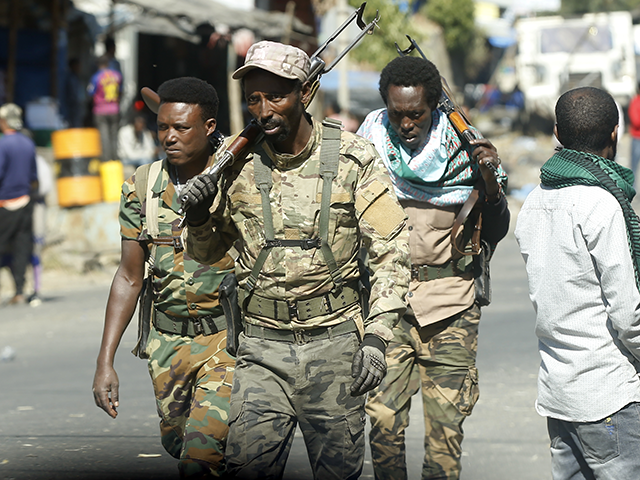Chinese Foreign Minister Qin Gang vowed on Friday that his country would invest heavily in the “post-war reconstruction” of Ethiopia, which recently exited a two-year war between its government, supported by neighboring Eritrea, and the Tigray People’s Liberation Front (TPLF).
Beijing’s vow to expand its footprint in the country follows a disastrous visit to Ethiopia by American Secretary of State Antony Blinken in March, in which he bizarrely apologized on behalf of America for not being “vocal” enough about the civil war and accused both sides of war crimes, prompting an infuriated condemnation by Addis Ababa.
Ethiopia is a member of China’s Belt and Road Initiative (BRI), a global infrastructure program in which China offers predatory loans to poor countries meant to be used to pay China to build roads, ports, railways, and other key development projects. BRI projects were booming when the war erupted in November 2020, forcing Chinese businessmen and engineers to flee.
The TPLF, a Marxist political party whose most prominent international member is World Health Organization (W.H.O.) Director-General Tedros Adhanom Ghebreyesus, was for a long time the ruling party in Ethiopia and enjoyed friendly relations with China. The Chinese government supported Tedros’ bid to lead the W.H.O. despite his lack of a medical doctorate, but rapidly shifted towards amicable relations with current Prime Minister Abiy Ahmed’s government following the TPLF’s fall.
A TPLF attack on a military facility in November 2020 prompted a full-scale attack on the northern Tigray region, home to the Tigrayan ethnic minority that dominates the TPLF and held political power at a national level before Abiy, an ethnic Oromo, took over. Abiy’s government blockaded Tigray, barring critical humanitarian supplies such as potable water and medicine from entering the region. Abiy also galvanized Eritrea to support his troops; the prime minister won the Nobel Peace Prize in 2019 for ending a prolonged conflict between the two countries.
The Tigray-Ethiopian government war ended with a ceasefire deal cut late last year that has largely remained in place through May. Violence remains rampant in the country, particularly between the Oromos and a third ethnic group, the Amharic people, who accused Tigrayan forces of mass rape and other atrocities in their villages during the civil war. Displaced Tigrayans have also protested the lack of adequate humanitarian aid and the presence of militias preventing their return home as recently as this week.
The conflict between the government and the TPLF, however, has subsided, and China’s foreign minister confirmed the Communist Party’s interest in capitalizing on reconstruction on Friday, during a meeting with Ethiopian Foreign Minister Demeke Mekonnen Hassen.
“Ethiopia is in a critical period of consolidating peace and focusing on development,” Qin reportedly said at the meeting, stating that China “is willing to deepen cooperation between the two countries in various fields to help Ethiopia’s post-war reconstruction, development and revitalisation.”
The South China Morning Post reported that Qin specifically promised “more emergency food aid to the Horn of Africa” and funds for “the reconstruction of Ethiopian infrastructure destroyed in the Tigray war.”
The Chinese state-run CGTN network quoted Qin as noting that his first travel abroad as foreign minister, a job he assumed in January, was to Africa.
“And among my destinations, Ethiopia was the first country I visited during the trip. Since we’ve established diplomatic ties for over half a century, the two countries have been supporting each other,” Qin reportedly said, “helping each other, setting an example for unity among developing countries and win-win development.”
Demeke, the Ethiopian foreign minister, also met with Chinese Vice President Han Zheng during his Beijing tour on Friday, the Chinese state-run Xinhua News Agency reported on Friday.
“China … firmly supports Ethiopia in consolidating unity and peace and realizing economic recovery, Han said,” according to Xinhua, “adding that China stands ready to work with Ethiopia to jointly build a Belt and Road of high quality, expand practical cooperation, and promote people-to-people exchanges.”
Demeke vowed that Ethiopia would “actively participate in the implementation of China’s important initiatives” in exchange.”
China’s potential rebuilding of the country would likely leave Ethiopia with onerous debts and little sovereign room for movement regarding its position on China’s various atrocities, most prominently the genocide of Turkic peoples in occupied East Turkistan and the erasure of the indigenous cultures of Tibet, Inner Mongolia, and other regions. Belt and Road countries often struggle to pay back their debts as a result of the steep interest rates and other predatory provisions in the secret BRI deals. Elsewhere in Africa, countries such as Kenya, Zimbabwe, South Africa, and Rwanda have struggled with both significant debts and criminal behavior on the part of Chinese imported labor, including abuses against locals and environmental damage.
Shortly before the civil war, in early 2020, reports began surfacing of mysterious deaths among nomads in Ethiopia living near a project run by Chinese oil and gas firm Poly-GCL, the construction of a pipeline that locals warned would destroy pivotal grazing grounds for herders.

COMMENTS
Please let us know if you're having issues with commenting.